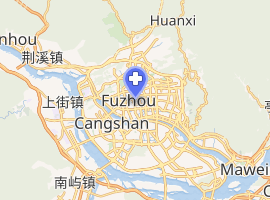Woolston Memorial Hospital
The Woolston Memorial Hospital was a Christian hospital in China and the first of its kind in Fuzhou.[1]
| Woolston Memorial Hospital | |
|---|---|

| |
| Geography | |
| Location | Fuzhou, Fujian, China |
| Organisation | |
| Care system | Western Medicine |
| Type | Teaching |
| History | |
| Opened | 19th century |
| Links | |
| Lists | Hospitals in China |
| Woolston Memorial Hospital | |||||||||||||||||
|---|---|---|---|---|---|---|---|---|---|---|---|---|---|---|---|---|---|
| Traditional Chinese | 媧氏紀念醫院 | ||||||||||||||||
| Simplified Chinese | 娲氏纪念医院 | ||||||||||||||||
| |||||||||||||||||
| 和新田婦幼醫院 | |||||||||||||||||
| Simplified Chinese | 和新田妇幼医院 | ||||||||||||||||
| |||||||||||||||||
History
The Woolston Memorial Hospital was formed from the expansion of a small Fuzhounese clinic run by a Methodist missionary within the walled city. It was located near Crow Pagoda Park in Gulou (26.077178°N 119.300441°E).[1] Originally, the hospital only accepted members of Christian churches to study on the medical course,[2] however this rule was lifted in 1906 and a standard exam was put in place. Of the four girls to pass the exam in 1906, three were not Christian.[3]
In 1907, the head physician was forced to rest due to serious illness and it was suggested that the hospital should be closed. However, the physicians sister insisted that the hospital remain open for the public and its reputation slowly recovered under her management.[4]
As a Christian hospital, the Woolston held regular services and sought to convert its patients and visitors. A report made to the Foochow Woman's Conference of the Methodist Episcopal Church in 1915 records 30 new baptisms, 20 new full church members, and a total of 1,252 women who had been taken to the nearby church.[5] The staff also campaigned against foot-binding and made an annual report of the number of women who had been persuaded to unbind their feet.[6]
In January 1927, thieves broke into the hospital and set fire to it. The entire building was burnt down.[7]
A Woolston Memorial Dispensary opened in 1930 in Longtian village (Chinese: 龙田镇) and at the Lucie F. Harrison Hospital, both in neighbouring Fuqing.[8]
Capacity
The table below shows the number of in-patients and home-visits attended by Woolston hospital staff over 16 years of Hü King Eng's management.[9][10]
| Year | In-patients | Patients visited in homes | Dispensary patients | Receipts |
|---|---|---|---|---|
| 1899 | 358 | 425 | 1,837 | $155.79 |
| 1903 | 902 | 1,080 | 12,929 | $830.64 |
| 1913 | - | - | - | $3,383.59 |
| 1914 | - | - | - | $3,655.12 |
| 1915 | 114 | 812 | 18,512 | $3,655.12 |
Notable staff
- Hü King Eng
- Hü Seuk Eng (Chinese: 許淑訇), younger sister of Hü King Eng and one of the first local Fuzhounese to train at Woolston
References
Notes
- Lin (2015), p. 49.
- Lin (2015), p. 51.
- Burton (1912), p. 57.
- Chan (1998), p. 60.
- Hü (1915), p. 27.
- Hü (1903), p. 49.
- Lin (2015), p. 52.
- Hurd-Mead & Guthrie (1931), p. 23.
- Hü (1915), p. 25-26.
- Hü (1903), p. 48.
Works cited
- Burton, Margaret E. (1912). Notable Women of Modern China. New York: Fleming H. Revell.
- Chan, Chi Ming (1998). "He Jingying". In Lee, Lily Xiao Hong; Stefanowska, A. D. (eds.). Biographical Dictionary of Chinese Women: The Qing Period, 1644-1911. New York: M. E. Sharpe. pp. 59–61.
- Hü, King Eng. "Woolston Memorial Hospital" (27-30 October, 1915) [Textual record]. Papers of Missionaries 1915-1972, ID: a069_015, pp. 25-27. Philadelphia, PA: The Legacy Center, Drexel University College of Medicine.
- Hü, King Eng (1903). "Reports: Woolston Memorial Hospital". Official Minutes of the Nineteenth Session of the Foochow Woman's Conference of the Methodist Episcopal Church Held at Foochow, October 6th to 9th, 1903 (PDF). Foochow, China: Methodist Publishing House. pp. 43–49.
- Hurd-Mead. "Bulletin of the Woman's Medical College of Pennsylvania, January 1931: College news" (1 January, 1931) [bulletin]. Records of W/MCP Publications 1850-present, ID: a076_096. Philadelphia, PA: The Legacy Center, Drexel University College of Medicine.
- Lin 林, Yujian 语尘 (2015). "独立修志气,悬壶济妇孺——中国近代女医生许金訇" [Independently cultivating resolve, practising medicine to help women and children: modern China's female doctor Xu Jinhong]. Mindu Wenhua (in Chinese) (2): 48–52.